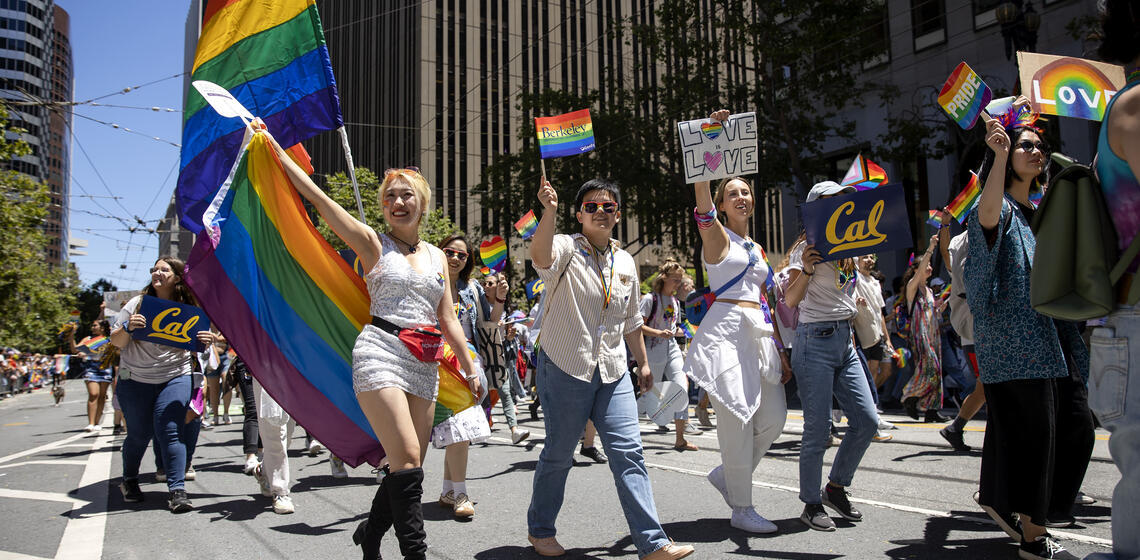By Jackie Krentzman
UC Berkeley offers an array of resources, initiatives, and spaces to affirm the campus LGBTQ+ community and its allies

GenEq at SF Pride 2022
When Alex K. Torrez, ’20, was deciding where to attend graduate school to pursue a Ph.D. in sociology, their experience as a transgender queer student at UC Berkeley tipped the scales.
“I accepted Berkeley’s offer because of the breadth of support and resources, along with the university’s responsiveness to meet the full spectrum of health needs for transition care, was so important to me as I transitioned,” Torrez says.
The Gender Equity Resource Center advocated to University Health Services on Torrez’s and ultimately other students’ behalf that it was critical for UHS to expand its insurance and provider coverage to serve the specific needs of the trans and nonbinary students on campus, and essential to ensure they were receiving care equitable to that offered to all students.
“The fact GenEq was on it, and the university was so responsive in recognizing the inequities in its health coverage and making the necessary adjustments, says a lot,” Torrez says.
Torrez is one of thousands of LGBTQ+ students and those interested in learning about LGBTQ+ topics who can access UC Berkeley’s array of resources, groups, and spaces.
“With our community already facing a hostile climate nationally, it is so important to have spaces where we can find support to both navigate challenges on campus and beyond and share our experiences,” says Em Huang, the Director of LGBTQ+ Advancement and Equity. “For some of our students, this is where they can find such support for the first time in their lives.”
Supportive resources for the campus LGBTQ+ community and allies are centered at Berkeley’s Gender Equity Resource Center (GenEq) and Queer Alliance Resource Center (QARC). While the university has made meaningful strides in advancing equity and inclusion, persistent challenges remain. GenEq and QARC play a critical role in improving the overall campus climate and addressing systemic barriers for the LGBTQ+ community. However, the responsibility for cultivating a truly inclusive and welcoming environment rests with every member of campus.
GenEq, founded in 1972, is a campus community center committed to fostering an inclusive Berkeley experience for all. More than 250 students, staff and faculty per week come to its community space in the Cesar Chavez Student Center for resources, services, and education and leadership programs related to gender and sexuality.
“We are not just about what is happening right now, but we also educate on the history and larger context of our community on and off campus,” says Huang. “Learning this history can give people the tools to confront discrimination and learn how to be engaged participants and leaders. Understanding the context of our history and movement can also play a powerful role in connecting students to their academic pursuits and help them reach their career goals.”
The Queer Alliance Resource Center (QARC), founded in 1969, is the student-led umbrella organization for the twenty-plus groups on campus that provide social, educational, and safe sex programming for the queer and trans community and their allies on campus.
One of the many students who have found resources, support and community through QARC is Megan Lam, an incoming third year majoring in integrative biology and rhetoric, who is QARC’s internal director. They say that its Cal Queer & Asian group has been especially beneficial.
“Sometimes it is more difficult for Asian folks to embrace their queer identity, because of traditional Asian beliefs around queerness,” Lam says. “It can be especially difficult for international students who often must hide their identity back home. I have heard many say that they could never imagine a space like this in their home country.”
QARC Program Director Vic Hosley-Sánchez says QARC, while always serving a vital need at Berkeley, is even more critical today.
“With recent attempts to invalidate the experience of trans and nonbinary folks, it is so important that we can let people know that we are here and that we offer safe and helpful spaces to find community and access resources,” says Hosley-Sánchez, noting they are seeing heightened fear and anxiety in the community, especially with the influx of anti-LGBTQ+ policies, executive orders, and rhetoric across the country.
“I don’t have a super supportive family, so having this queer and trans community at Cal has been so beneficial in helping me develop my own identity,” says Z, the co-leader of Berkeley’s Trans Student Wellness Initiative. “I feel like the people I have found through GenEq and QARC are my chosen family and give me a sense of safety and belonging.”
For students who may not be sure which resources make the most sense for their needs, or how to access them, Huang has some sage advice.
“We encourage people to explore, both our online resources and most of all, our physical spaces, where you can connect with other students and get valuable information and support from our expert staff. You will very likely find a touchpoint as our community is very diverse — that’s the beauty of the Berkeley community.”
